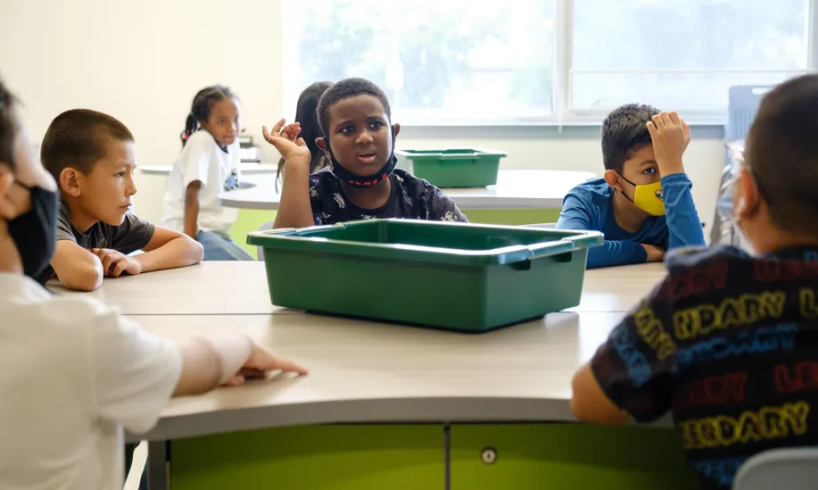
When Aurora schools decided to shorten their quarantine period to five days, aligning with new state and federal guidelines, school nurses found out almost at the same time that families did.
Nurses didn’t have time to provide input into how the rule would be rolled out in their schools. Now, they say, each school has to figure out how to deal with the required precautions when students come back on Day 6 and may still be contagious.
“This might be the most complicated guidance we’ve endured. We had no time to absorb data,” said Jennifer Barnes, an Aurora school nurse.
Tiffany Curtice, another Aurora school nurse, said it makes her feel unvalued.
“Our knowledge and experience and education has not been valued and or listened to, in my opinion,” Curtice said.
Several school nurses spoke to the Aurora school board last week because they said the district is not hearing or heeding their voice. They say that is making their jobs more difficult at a time when their workload has already multiplied.
District officials say their process provides multiple ways for nurses to provide input. And officials insist that they are following all of the guidance from Tri-County public health to ensure schools can be safe places for students.
“I absolutely get it, this has been very hard on our nurses, on our teachers, on everyone in the district,” said Mark Seglem, the Aurora district’s chief of staff. “Our No. 1 goal is to keep our kids in the classroom safely.”
Across the state, some districts including the Jeffco school district are no longer tracing contacts of each positive case, and have told families they may not get exposure notifications.
In a statement, Mellissa Sager, the policy and public affairs officer for the TriCounty Health Department, said that even when districts aren’t able to identify all close contacts, other mitigation measures still work to keep students safe.
“Just like health departments across the country, as cases surge, schools must triage their COVID-19 response activities and may not have the capacity to identify all potential close contacts,” Sager’s statement read. “TCHD is confident that our schools’ layered mitigation strategies continue to reduce risk in the classroom and TCHD continues to work with school leaders to work through any higher-risk situations in schools, like outbreaks.”
In Aurora, school nurses are still documenting all cases and contact tracing to determine if other students need to quarantine or not.
Nurses, like other employee groups, also have faced staff shortages. District officials said that nine of 60 nurse positions are vacant but sometimes staffed temporarily by agencies.
Nurses said that the workload from tracing has been heavy, but it has also provided evidence that transmission is occurring at school. They aren’t advocating for closing schools, however, but they want stricter rules to stop kids from getting sick.
Some Aurora nurses worry that certain rules, like one that allows students to avoid quarantine if they meet mask compliance, are not enough to keep kids safe in school. The district considers whether students comply with requests such as to pull their mask up or cover their nose — even if their masks come down repeatedly and their faces are exposed throughout the day.
One nurse pointed out that younger children, especially preschoolers, have fewer ways to stay safe: They’re too young to be vaccinated, and their learning requires a lot of close contact and lots of singing — which makes proper mask wearing more important.
“We’re here to advance the education and the learning of students. From the nursing perspective we do that through maintaining or advancing the health of children,” said Sharon Niebuhr, an Aurora school nurse. “If I feel like I don’t have all the tools to be able to do that, I can go home with a heavy heart. I don’t want kids out of school. I want to employ scientific principles in order to stop the spread of things that can keep them out of school.”
Niebuhr said that school nurses often develop close relationships with students and families and have learned of cases of students who have ended up hospitalized. One district student has died due to COVID, she said. Public health officials said they don’t track individual student deaths, and district officials did not respond to a request to confirm that information. Statewide, 15 school-age children have died from COVID since spring 2020.
“We don’t say, ‘Oh, it’s just a couple kids that are sick,’” Niebuhr said.
“Personally, what weighs heavy with me is the effect that it has on our communities,” Barnes said. “It weighs on me really heavy because I know of all these stories.”
Nurses say that their input into school policies would help think of scenarios such as where kids can eat lunch when they come back from quarantine on Day 6 and are not supposed to eat near others.
Although Seglem admits that the latest quarantine update did roll out faster than they would have liked, he said that the district wanted to give schools the flexibility to figure out some details on their own based on what worked for their building. Some options the district and TriCounty public health offered included setting up a lunch table just for students who are returning from quarantine, and keeping groups of students in their classrooms.
Still, nurses said policies may not work well at the school level, as the district may not realize all the different scenarios nurses may have to consider, when the district creates guidelines without consulting school nurses.
“The nurse in the school is the one who ends up seeing what the problems are,” Niebuhr said. “There may be an interpretation of guidance that just doesn’t work.”
This article was originally posted on Aurora school nurses want more input, stronger COVID protocols